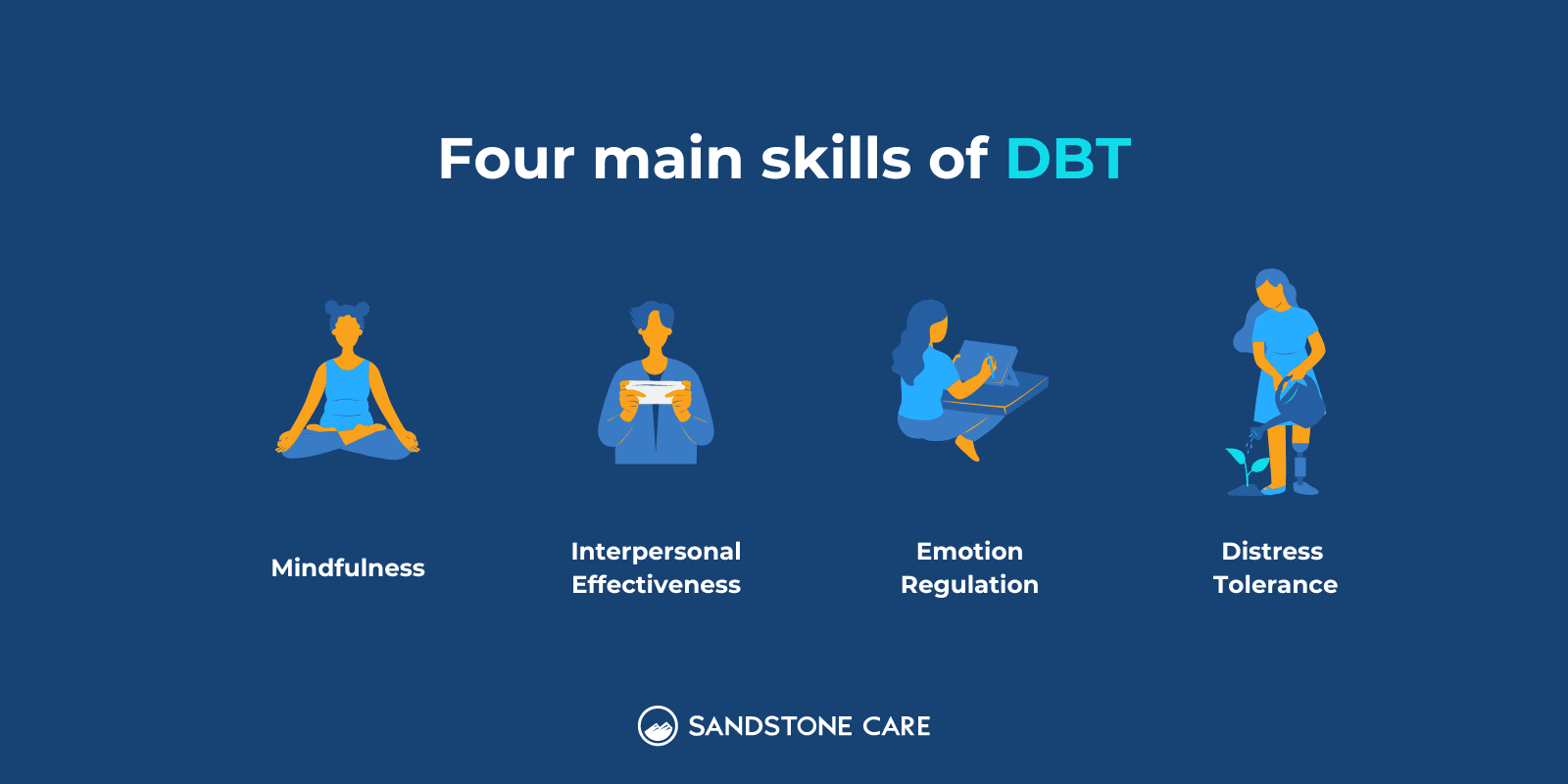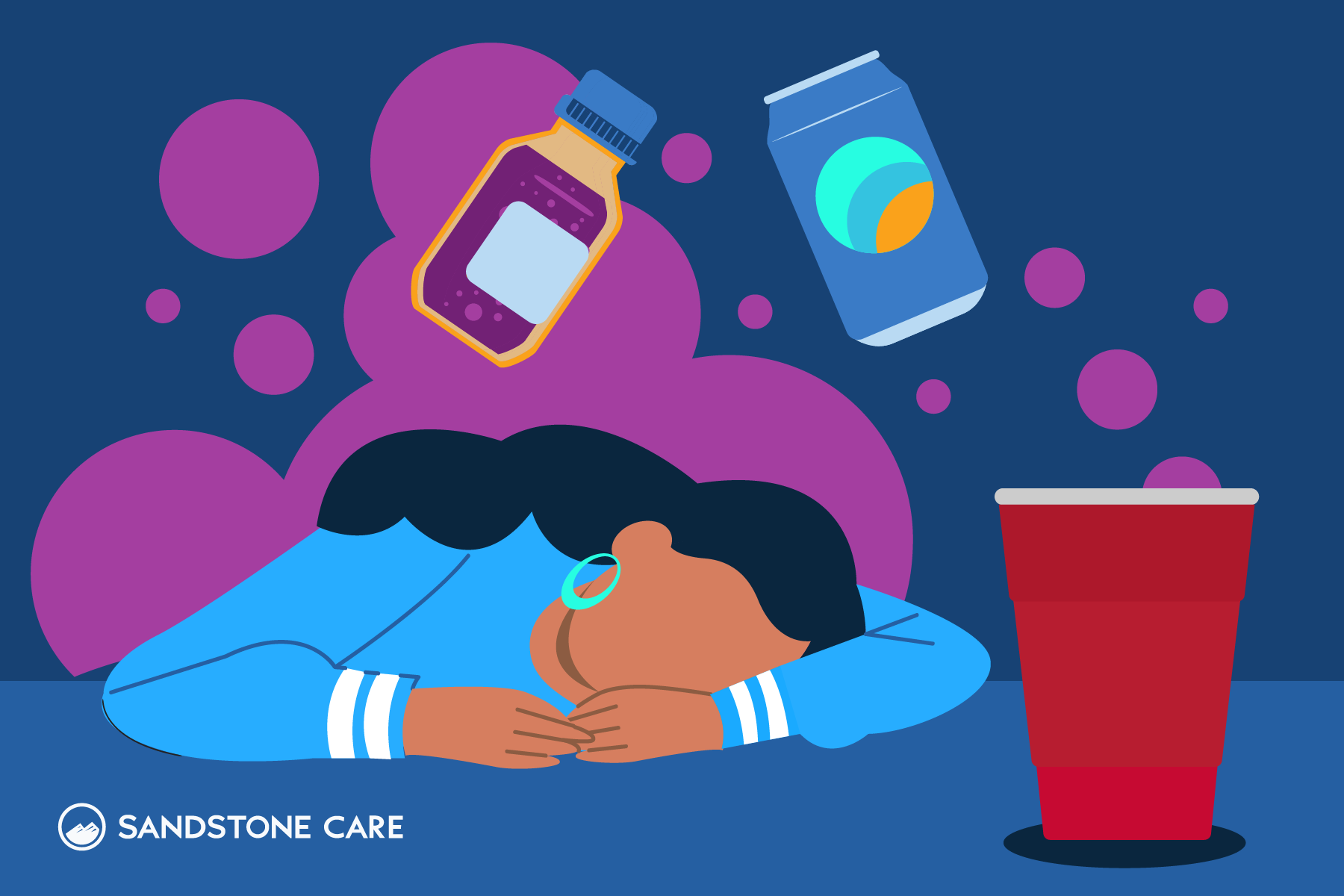What is Dialectical Behavioral Therapy (DBT)?
Most substance abuse treatment programs feature either a 12-step model or, more recently, a Dialectical Behavioral Therapy (DBT) model.
The 12-step model is most commonly associated with Alcoholics Anonymous while DBT is most commonly associated with mental health treatment. Rarely are these two approaches used in conjunction with one another.
The general principles of DBT address mental health while the 12-step model focuses on sobriety. These two models not only compliment one another very well, but when used together can actually make both models more accessible, especially to young adults and adolescents.
As quoted by an expert in the industry, “Alcoholics Anonymous (AA) offers ‘the promises of the steps’ and Narcotics Anonymous (NA) gives the promise of ‘freedom from active addiction’ both of these gifts of working the steps complement DBT’s focus” (Platter & Cabral, 2010).
There are four key skills in DBT that parallel or substitute well for different aspects of 12-step’s “Big Book” for young adults and adolescents. DBT’s four skills include Interpersonal Effectiveness, Distress Tolerance, Mindfulness, and Emotional Regulation.

Interpersonal Effectiveness
Interpersonal Effectiveness focuses on just that, the life skills (L in the CLICC) needed every day to communicate and interact with others.
Addressing interpersonal skills allows one to become much more effective at not only working with the world around them but also working with the world within. It is well documented that relationships suffer from addiction.
Through work on Interpersonal Effectiveness skills, individuals can work on maintaining and improving relationships in order to connect with others (C in CLICC).
The 12-step model identifies the same symptoms of addiction, the harm, and destruction to relationships. Addiction not only leads to damaging existing relationships but makes it difficult to form healthy and supportive new ones.
“The alcoholic is like a tornado roaring his way through the lives of others. Hearts are broken. Sweet relationships are dead. Affections have been uprooted. Selfish and inconsiderate habits have kept the home in turmoil.” (Alcoholics Anonymous, p. 82)
Through integrating DBT and a 12-step approach at a treatment center, clients have the ability to practice interpersonal effectiveness skills in a group setting.
Clients are then able to apply these skills to build a new community (C in CLICC) outside of treatment, including 12-step meetings and other areas of their life in order to have much healthier and more supportive relationships.
Distress Tolerance
Distress Tolerance is the use of skills that allow us as humans to cope and survive during a time of crisis, as well as help us tolerate pain – both short-term and long-term pain.
There are many advantages of using Distress Tolerance skills in the treatment of substance abuse and addiction.
One of the most important areas, especially in early recovery, that Distress Tolerance skills can be applied is for effectively managing cravings and tolerating uncomfortable situations.
In an outpatient setting, this is essential because clients are not removed from an environment in which numerous triggers often exist.
Accepting reality is one of the skills groups that helps with managing these cravings and uncomfortable situations. A key piece of the concept of acceptance is that pain creates suffering only when we refuse to accept the pain.
One 12-Step slogan that relates to this concept is “pain is inevitable, misery is optional.” The AA Big Book devotes an entire chapter to the concept of acceptance.
The Serenity Prayer, said in thousands of 12-Step gatherings, reminds those in the fellowship of the importance of accepting and letting go of the things that out of our control. (Platter & Cabral, 2010).

Mindfulness
Mindfulness practices are gaining popularity in the treatment of a variety of mental health issues, which can be attributed to the fact that mindfulness is becoming more reputable within the medical field.
Mindfulness practices are increasingly being shown to help with everything from ADHD to schizophrenia and especially substance abuse. DBT has been using mindfulness as a cornerstone since the 1980’s.
Incorporating mindfulness into the treatment of addiction has far-reaching effects. In particular, Mindfulness can be a much more accessible concept, especially for adolescents and young adults, than the traditional higher power associated with 12-step models.
Mindfulness also allows people to have a better understanding of their different states of mind, which are identified as the emotional, rational and wise mind in DBT.
This approach also allows people to recognize some of the dysfunctional thinking patterns that contribute to substance abuse and addiction. A parallel concept in AA is the mind can be a trickster and will create the illusion of being reasonable.
This concept is extremely important in recovery since it emphasizes how an individual’s thought process is often compromised and difficulties arise when relying on one’s own thinking and willpower.
As NA states,
“it is a “we” program’ and AA reminds us that ‘your best thinking got you here’.”
Emotional Regulation
The DBT target of Emotional Regulation focuses on balancing emotions and working through problems with anger.
Building on mindfulness, adolescents are driven by what they feel they need in emotional mind and this skill works to combine that emotional mind with a rational mind, which could typically “mask” one’s emotions or otherwise appear competent, to apply wise mind, allowing the best of both worlds to collaborate and think through the most effective way to handle a situation.
Parents can also support adolescents with their own development of parallel skills through reacting in Emotional Mind, lecturing or give explanations in Rational Mind, and responding in Wise Mind.
Internal unmanageability, which relates to the emotional volatility of addiction, is one of the items that is described in the 12-Step literature and is also closely linked with the DBT skill of Emotional Regulation.
“Emotional volatility is often one of the most obvious ways in which we can identify personal unmanageability”
Conclusion
Collectively, utilizing a treatment approach that applies DBT and the 12-step model allows individuals to address not only the underlying issues of addiction but also the personal issues of managing the daily stressors and relationships of life in order to develop and maintain a healthy state of mind.
Allowing the two programs to work cohesively allows the client to address their addiction head on and gives the client the ability to sustain a happy life in recovery through applying the skills in daily life with the support of a community like AA and NA.
References
Link to article: Taming the Wild Horse by Platter & Cabral, 2010
About Sandstone Care
Sandstone Care is a Denver, Colorado-based treatment program for young adults and adolescents struggling with substance abuse and co-occurring disorders.
Sandstone Care offers a full continuum of outpatient care including Extended Care, Day Treatment, Intensive Outpatient, and General Outpatient Programs for young adults (ages 18-30) and adolescents (ages 13-18).
Sandstone Care believes that successful outcomes are achieved through a systemic, evidence-based approach that addresses the entire individual as well as their environment – this means providing academic & vocational support to help individuals achieve their goals and discover their strengths, family participation to educate and support the entire family system, psychiatric and dietitian evaluations and support to promote a healthy mind and body, as well as community-based activities along with the more traditional evidence-based group and individual therapy.
If you or a loved one needs additional support, call our confidential line, at 888-850-1890 or fill out the form on our website, and our admissions team will be able to answer any questions as well as guide you and your loved ones toward the path of long-lasting recovery. For more information, visit sandstonecare.com.







